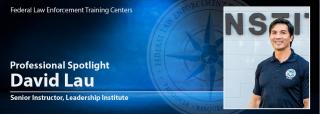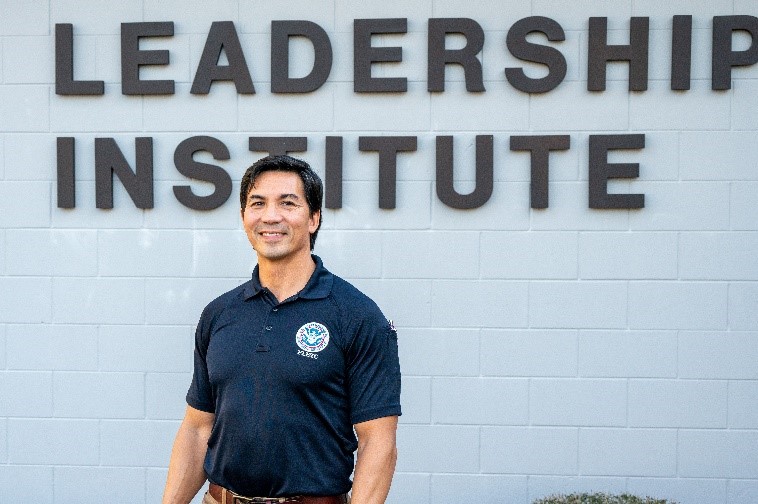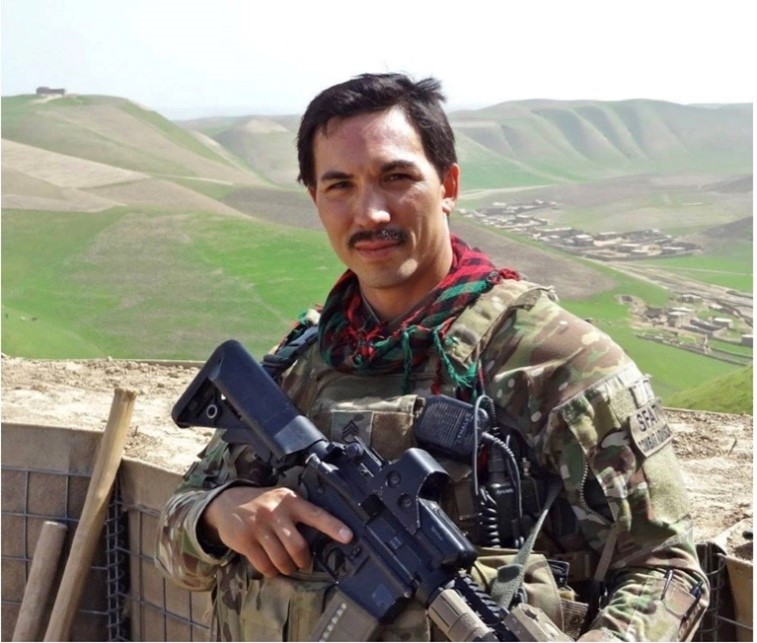
By Brian M. Jones
David (Kawika) Lau lives in a world that requires him to facilitate education that is atypical for law enforcement instruction. However, when Lau stands in front of a class, he delivers wisdom every new student at the Federal Law Enforcement Training Centers (FLETC) needs.
This need is at the core of every individual and as a Senior Instructor with the FLETC Leadership Institute Lau seeks to guide students to the introspection necessary to recognize their own “why.” Why are they walking down the arduous path to become federal officers. What is their purpose. What guides them. What is the ethos they adhere to.

A wealth of knowledge is stacked in nearly every corner of his office. Spines are creased and pages are worn as the words of thinkers such Aristotle and Marcus Aurelius live within the space of Lau’s mind. Finding a way into the depths of self-realization is no easy task. Guiding others to do so is even more challenging. No matter how many books one may read or quotes they can recite, leading by example proves to be paramount in this type of training. Lau regularly demonstrates that these words are not empty platitudes but a part of his own ethos.
A life of service has continually refined the ethos that guide Lau. Following active-duty service in the U.S. Army from 1992 to 1998, Lau joined the U.S. Border Patrol in January 2000. Just over two years later, in 2002 Lau became a Federal Air Marshal (FAMS). While with the FAMS, Lau found himself back with the Army which led him to the National Guard’s 19th Special Forces Group. Lau’s time with this unit entrenched virtues that would save his life.
Special Forces elicit images of warriors who are the epitome of physical prowess. The training and job demand each to perform at a level far beyond that of the average soldier. The physical demands are indisputable, however, Lau soon learned that his unit emphasized holistic training. The unit incorporated the mind as the central component necessary for success on the battlefield. To be world class they had to go far beyond the physical and be cerebral. Proficiencies with guns and knives stood next to stacks of books that would guide the minds of these elite soldiers.
In 2012, Lau’s unit deployed to Afghanistan. Fine-tuned physical training merged with a mental fortitude driven by a strong sense of purpose. Every skill tested in combat. The men he served with, Americans and Afghans alike, became family. On April 4, 2012, that family as well as Lau’s life was shattered in an instant when a suicide bomber ambushed them while on foot patrol. Gone were the regular smiles of Zohor—Lau’s interpreter, friend, and brother, who had recently had his student visa approved to study in the United States. Conversations with his Afghan brother and counterpart, Command Sergeant Major Ghulam Sakhi, would never happen again. The camaraderie of life with fellow U.S. Army soldiers Master Sergeant Shawn Hannon, Master Sergeant Jeff Rieck, and Captain Nick Rozanski disappeared into the fog of memories.

Riddled with shrapnel, in a wheelchair for months, and hospitalized for three years Lau was in a fight for his own life. He evoked the lessons learned from one of his mentors, Master Sergeant Henry Leerkamp, who had been a prisoner of war during the Korean conflict and spoke of living funerals. Hearts were still beating, but the minds and souls had died. Leerkamp acknowledged the only thing keeping them alive was their own mind. It was now Lau’s mind that had to keep him alive. To relocate his purpose and live.
Much of the wisdom emphasized through the Special Forces Group’s holistic training was vital through this process. Wisdom channeled during that training included the words of holocaust survivor, Viktor Frankl, who says, “Those who have a ‘why’ to live, can bear with almost any ‘how’.” The journey through the ‘how’ was arduous and consisted of versions of himself he is not proud of. He fought the battles against survivor’s guilt and his feelings that he should be amongst the dead. Ultimately Lau found his anchor points in his family and education. The foundation that had been built stood strong as he rebuilt himself around his ‘why’.
Post traumatic growth reshaped Lau’s life and he believes he is a “way better person now than the instant before the bomb went off” and has a “much deeper appreciation for life.” Following his time in the hospital, Lau returned to the Air Marshals in the Seattle Field Office. About a year later, Lau embarked on his journey as an instructor at FLETC.
With the 19th Special Forces Group, Lau was introduced to Meditations, a collection of personal writings from Roman Emperor Marcus Aurelius. With a climate that often conveys hostility to law enforcement, Lau guides his students to understand their purpose. Aurelius states, “No matter what anyone says or does, my task is to be good. Like gold or emerald or purple repeating to itself ‘no matter what anyone says or does, my task is to be emerald, my color undiminished.” He wants the students to see that they are an emerald, that they can define who they are at any time regardless of what others may say or do.

Around three dozen ball bearings from that bomb are still inside Lau’s body. Mental and physical pain are recurring parts of his life. Yet he passionately guides students down a path to self-discovery. Leads them on a journey to find their own why. Steers them to follow their ethos. Influences them to fulfill their purpose. In 2021, Lau was recognized as FLETC Instructor of the Year, but to many students this is an honor that has extended to every year of their lives. These students regularly reach out to Lau to express their appreciation and how they have never forgotten the words and wisdom that he has shared with them.

